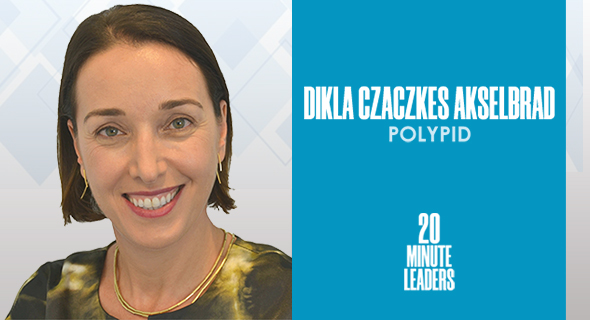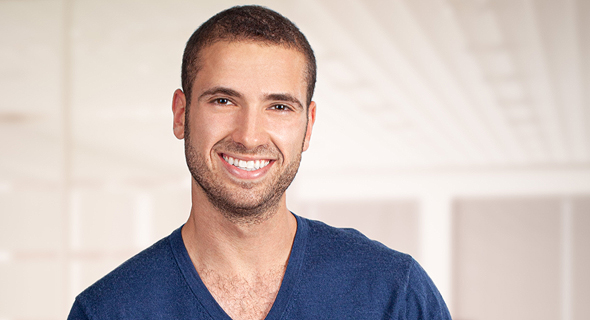20-Minute Leaders
“In the biotech industry, the one thing that is missing more than anything else is funding"
Dikla Czackes Akselbrad, executive vice president and CFO of PolyPid, joins Michael Matias to discuss her bio-pharmaceutical company
Click Here For More 20MinuteLeaders
Take me through your journey and how you end up as executive vice president and CFO of PolyPid.
I knew from childhood that I want to be in a leading position with companies that are meaningful and successful in many ways. For some reason, I thought that having a strong financial background can open the door for me to get fairly quickly, fairly easily to get to those positions. I started learning in university economics and accounting, and I registered for this BA knowing that I have no intention of becoming an accountant in a firm.
I did work for the leading insurance company in Israel, but I transferred to Ernst & Young to be with the high tech, the days of the early tech. It was wonderful to see people in different positions at these companies, from CEO to bookkeeping, feeling passionate about what they do. I wanted to be part of this in history.
I started in this area, but very quickly I moved on to biotech. Biotech was, in a way, love at first sight. It's much more challenging. The processes are much longer. You don't build a company in a year, and in the year after, you sell it for billions. You usually work for 10 years to get the product and a drug to approval. You have to be much more patient. Some days everything looks like you're going to conquer the world. A few days after, things are not progressing. Results are not looking good.
I’m passionate to be in this position. Being a CFO, I could be in many companies, like gaming, construction, insurance, or banking. But (I enjoy) being in biotech and being part of the team that is leading the company into developing drugs that could actually save that life and change situations that have been unmet needs for years.
 Dikla Czackes Akselbrad, executive vice president and CFO of PolyPid. Photo: Dikla Czackes
Dikla Czackes Akselbrad, executive vice president and CFO of PolyPid. Photo: Dikla Czackes
Coming from a financial background, what was your entrance into the biotech world?
I joke that my mother has a degree in biology and my father has an economic degree. I had to please both. But to be serious, I think that for people that want to learn and to feel that they are developing in their work and have passion for what you do, the biotech industry really is best suited. You learn, every day, something new. Biology is an area different from computer science and that is not fully understood. There is more. The unknown is greater than the known.
Being part of this industry, coming in the morning and learning something new about our product. It's not a question of whether it will sell. We know it will sell. The question is whether it works as we are hoping for, which is very different from the tech industry. When you develop something, you know you will be able to solve it. But you don't know if there will be a market for it. We know there will be a market.
Tell me about the role of a financial executive within a biotech company. You don't necessarily deal with the same things that a traditional CFO of a startup would.
I'm quoting someone much smarter than I who said that CFO doesn't stand for chief finance officer in an innovation company, but it stands for "chief focus officer." And it's very much the case. Also, in the biotech industry, the one thing that is missing more than anything else is funding. Because this is a long journey that will take years, you need to fund it along these years. You need to create a financing strategy that will support the company while it's private, and then while it's public. And then you want to bring another product to the pipeline. The relationship with the investors and the banks is something that’s a day-to-day relationship.
Tell me about the pain point that PolyPid is trying to solve with what's happening today with site infections and surgery.
Today, worldwide, about five percent of the patients on average that go to surgery will have some level of infection.
These are infections that take place why?
Because of the actual surgery. If someone is having surgery, the skin is cut. The muscles are cut. Sometimes, the bone is cut. This cut creates two things. On one hand, you cut the blood supply to the area. That means that your immune system cannot get to the area well and treat any intruders that are coming from the outside. Also, you have an opportunity for the bacteria to go in. You opened the body, but you also stopped our defender, our immune system, from getting to the area. In many surgeries, you have some level of infection after that. It could be very simple: the patient gets antibiotics and everything's well. But in other cases, it could lead to mortality and disability. Especially in the big surgeries and if patients also have some risk factors.
What we are doing is very cool. Our founder and CSO, Dr. Noam Emanuel, has developed a concept, a platform that can encapsulate and release almost any drug locally. It has structure: granules the size of salt are structured from thousands of layers. Every few minutes, the outer layer disintegrates and the drug is released. This is the matrix that we call PLEX. We have over 100 patents around it. What we've done initially is take this platform and pair it with antibiotics.
Let's say a patient has open heart surgery. Before closing the incision, the surgeon applies our D-PLEX100. It looks like a paste. Gradually, the antibiotic is released along the incision for four weeks. This creates very high local concentration in longer incisions without influencing the microbiome, without any systemic exposure. You have maximum exposure where you need it and nothing that goes into the whole body.
How long does it take to build something like this with a hundred patents? What is the life cycle of a company like PolyPid?
It's taken us several years to first build the platform and validate the platform in different indications. About seven years ago, we decided to focus and established our own pipeline, initially, focusing on surgical site infection. We are very close to approval. We’ve announced our second product that is pairing the platform with chemotherapy for brain tumors. Same concept. Local chemotherapy, avoiding the systemic exposure of chemotherapy with all its side effects, as well as enhancing the therapy.
What really sparked your curiosity as a child that led you to wanting to be an executive?
I literally remember myself daydreaming, imagining myself in the chair that I'm sitting in now. I knew what the feeling should be. I try to visualize this journey as a child. What really intrigued me was to be in a position where you can lead people. You could be part of the team. You could be in these points in a company that makes a difference in the industry that I am in, which I think is the best, and actually save lives. That's very inspiring.
What are a few words that you would use to describe yourself?
I must start with persistency and creativity. I think you have to be very consistent with your path and clear with your path in your life and very creative in the day-to-day. This is how I live my personal life and my career. Always consistent and persistent in the long-term and the past, but very creative on the day-to-day. What I strive for and have most of the day is passion.
 Michael Matias. Photo: Courtesy
Michael Matias. Photo: Courtesy Michael Matias, Forbes 30 Under 30, is the author of Age is Only an Int: Lessons I Learned as a Young Entrepreneur. He studies Artificial Intelligence at Stanford University, while working as a software engineer at Hippo Insurance and as a Senior Associate at J-Ventures. Matias previously served as an officer in the 8200 unit. 20MinuteLeaders is a tech entrepreneurship interview series featuring one-on-one interviews with fascinating founders, innovators and thought leaders sharing their journeys and experiences.
Contributing editors: Michael Matias, Megan Ryan



